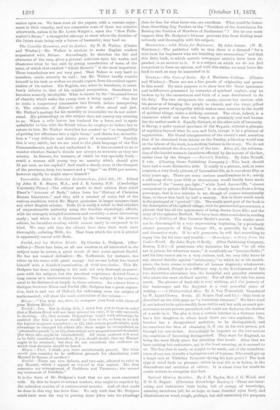The Comedic Humaine, and its Author. By H. H. Walker.
(Chatto and Windus.)—Mr. Walker is anxious to make English readers acquainted with Balzac. Accordingly, he sketches the life and character of the man, gives a general criticism upon his works, and illustrates what he has said by giving translations of some of the tales, of which that entitled "Albert Bavaria " is the most important. These translations are not very good That Balza° is very bard to translate, needs scarcely be said ; but Mr. Walker hardly acquits himself in his task as well as wo should expect, from his evident appro. elation of his author. His English, too, when he translates, is mani- festly inferior to that of his original composition. Sometimes he becomes scarcely intelligible. What is meant by the "thousand forms of chastity which make the young man a being apart ? " One has to make a conjectural translation into French, before interpreting it. The criticism of Ralzao's genius is often sound and just. Mr. Walker's apology for his morality or immorality we do not under- stand. His phraseology on this subject does not convey any meaning to us. When a wife leaves her husband for a lover, and is again unfaithful to him with the friend 'whom he employs to induce her to return to him, Mr. Walker describes her conduct as "an incapability of getting her affections into a right focus," and thinks hoc, neverthe- less, a " very delicate and dainty grace of womanhood." Possibly this is very subtle, but we are used to the plain language of the Ten Commandments, and do not understand it. It has occurred to us to wonder whether Balzac'S details are always as accurate as they are minute. In finance, for instance, of which he was specially fond,— could a woman still young buy an annuity which should give 15 per cent. on her capital ? And could a dandy, even in the cheapest of the provinces, keep two houses and a " tiger " on £160 per annum, however rigidly he might starve himself ?
































 Previous page
Previous page